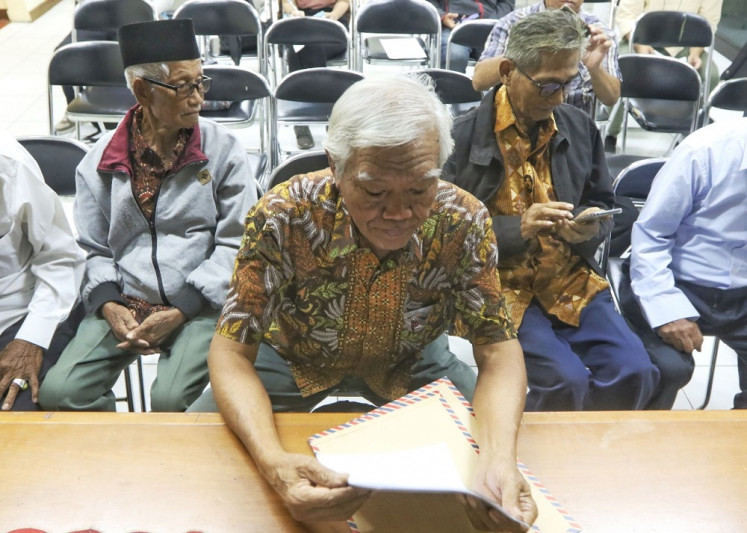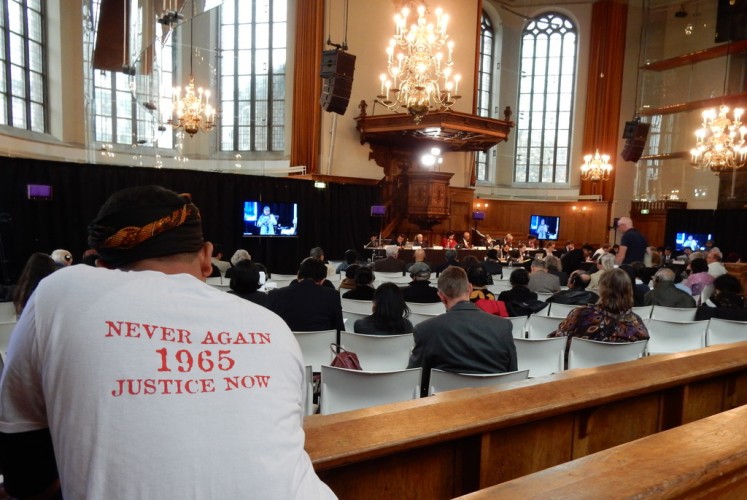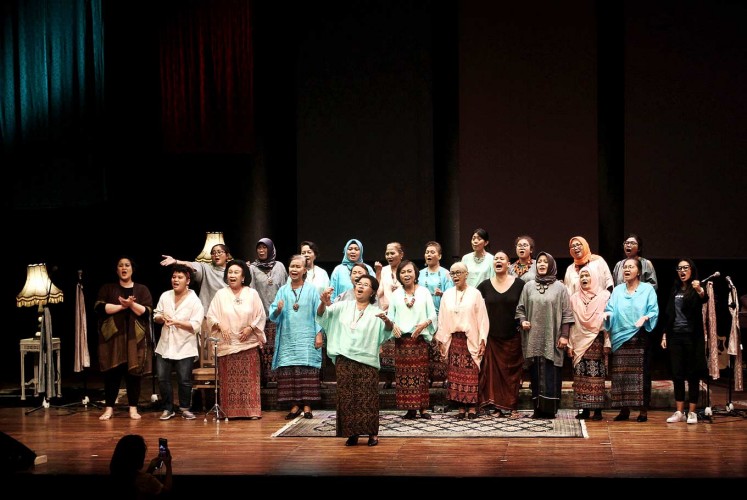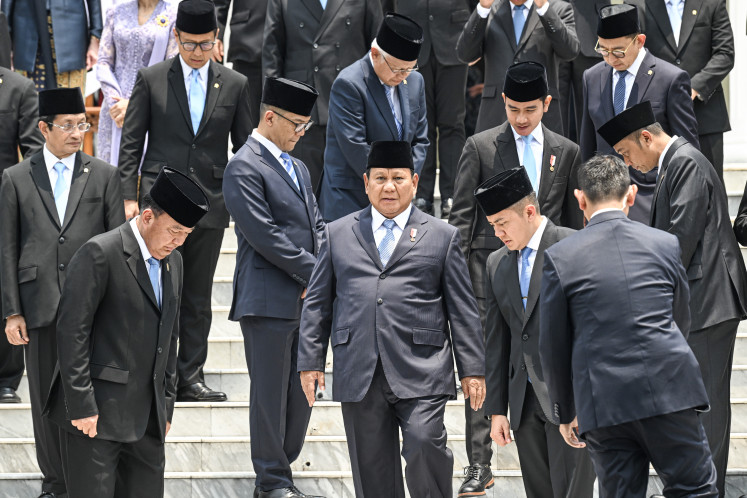Popular Reads
Top Results
Can't find what you're looking for?
View all search resultsPopular Reads
Top Results
Can't find what you're looking for?
View all search results1965 survivors seek closure as UK files expose Western role in mass killings
The newly declassified documents add to a body of evidence of Western involvement in Indonesia’s 1965 anticommunist massacre.
Change text size
Gift Premium Articles
to Anyone
O
n Oct. 5, 1965, 7-year-old Ita Fatia Nadia was told by her mother that she and her four siblings needed to leave home and go into hiding separately.
The night before, she had gathered all her father’s books from the bookshelves and hid them in a well near her house. They were the books her father often read with his friends, written in German, Dutch and English, about Marxism.
Ita’s father, who was part of the Pemuda Pathuk – a group of young people who resisted the Japanese occupation around Pathuk, Yogyakarta, during and after World War II – and a member of the underground left-wing Indonesian Socialist Party (PSI), was nowhere to be found when Indonesian Army soldiers came by and inspected her house in the following days.
Ita repeatedly asked her mother what had happened but was told to keep quiet. She then heard on the radio that six generals had been killed not long before. But it was the unusual absence of her father that bothered her.
“Your father needed to go somewhere. Now, we pray that he is safe and nothing happened to him,” said her mother.
Ita left with her sister and went into hiding at a family friend’s house close to her home. The family reunited two weeks later, but still without Ita’s father.
She watched as other members of her family and neighbors went missing only to find out later that they had been killed.
“I remember seeing bodies everywhere on my way to school. My mother kept telling me not to ask and to look away,” she told The Jakarta Post recently.
Declassified British documents
When that dark chapter of her life was brought back in the spotlight following last week’s declassification of British government documents that revealed the role the United Kingdom played in inciting the anticommunist purge of 1965-66, Ita was determined to have the documents play an important role in bringing closure to the victims.
The now 62-year-old Ita is a historian and activist who spent her youth reuniting the former political prisoners of Buru Island with their families. She has written a book documenting the suffering of members of the leftist women’s group Gerwani, who were accused of having seduced, sexually tortured and killed the six generals whose deaths help set off the massacre, an Army fabrication that was recycled as propaganda.
Ita told the Post that the documents revealed the UK’s propagandist and intelligence involvement in greater detail than similar declassified documents from the CIA.
“These are not just more British documents. A movement led by Indonesia and a group of its women is written there,” said Ita.
“The British had a list of targets who should be killed first. [Members of] Gerwani, the BTI [Indonesian Farmers’ Front], Pemuda Rakyat and Lekra were among them. The Indonesian Communist Party [PKI] had relied on these four organizations, even though most of them were not under the PKI and acted independently, but they had a stronger membership base than the PKI,” she said.
The UK embassy in Indonesia did not respond to The Jakarta Post’s request for comment.
Open wounds: The chairman of the Foundation of Victims of the 1965/1966 Killings (YPKP65), Bedjo Untung, (center) and colleagues visit the National Commission on Human Rights in Jakarta on Dec. 13, 2019, to submit their finding on 346 mass graves located in Java and Sumatra that they believe are related to the state-sponsored anticommunist purge. (JP/Dhoni Setiawan)
‘Communist cancer’
Last week, The Observer reported that the declassified documents revealed how a propaganda unit from the UK’s Foreign Office secretly egged on prominent Indonesian anticommunists, including senior army commanders, helping launch the mass murder campaign of 1965-66.
This involved the production of a newsletter purporting to be produced by “Indonesian patriots” calling for the elimination of the “communist cancer”. The Foreign Office also established a radio station in Malaysia that broadcast anticommunist messages into Indonesia.
The propaganda targeted an array of prominent people, including Army generals, and extended up to then-president Sukarno himself. The campaign warned that Indonesia would be in danger “as long as the communist leaders are at large and their rank and file are allowed to go unpunished”.
At least 500,000 people linked to the now-defunct Indonesian Communist Party (PKI) – then the biggest communist party under a non-communist regime – and as many as 1 million, were murdered in 1965 and 1966, a purge that led to the downfall of the left-leaning Sukarno and his replacement by Suharto, whose New Order government would reign for more than 30 years.
The British propaganda campaign was conducted in response to president Sukarno’s hostility to the creation of the Malaysian Federation in 1963.
To forestall its creation, he launched a diplomatic and low-level military campaign known as Konfrontasi (Confrontation), which involved armed incursions of Indonesian troops into Malaysia, where in some instances they clashed with British and Commonwealth troops.
The operation was touted as “one of the most successful propaganda operations in postwar British history by those who led it”, The Guardian wrote.
Western complicity
The newly declassified documents add to a significant body of evidence of Western involvement in the slaughter.
In 2016, expert witness Bradley Simpson from the University of Connecticut and Wijaya Herlambang testified before the International People’s Tribunal for 1965 (IPT 65) that the UK, along with United States and Australia, had played a role in the massacre.
The following year, the US government released 39 documents dating from 1964 to 1968 that showed that US authorities were actively supporting the Indonesian Army in its effort to wipe out alleged communists.
The documents show that US officials knew that most of the victims were entirely innocent. US embassy officials even received updates on the executions and offered help suppress media coverage.
“The British officials were calling for killing, but the Americans were actually participating in the killing,” said historian Greg Poulgrain. “Both the UK and US worked together to create the threat known as ‘the council of generals’, which inspired the 30th of September Movement to act.”
The International People's Tribunal (IPT) on 1965 crimes against humanity in Indonesia is held in the Nieuwe Kerk in The Hague, the Netherlands, on Nov. 10 to 13. (Courtesy of the International People’s Tribunal 1965/-)
Deafening silence
Sri Lestari Wahyuningrum, a researcher for the IPT 65, said the new revelation confirmed what the tribunal had found and what had formed the basis of their indictment in 2016.
“The British documents are crucial evidence as they come directly from primary sources. We tried to find this when compiling our reports for the tribunal. These documents underline the indictment,” said Lestari.
The revelation also proved, she said, that there were still many facts about the 1965 tragedy left to be uncovered.
Usman Hamid, director at Amnesty International Indonesia, said the declassified documents could play a big role in Indonesia’s truth-seeking efforts and could lead to reconciliation between the state and the victims – but “only if the government is willing to reveal its dark past”.
“This fact cancels the Indonesian government’s argument that the tragedy cannot be investigated as it happened a long time ago and the evidence has been lost,” he said.
Bedjo Untung, a victim of the anticommunist purge and the founder of the 1965 Murder Victims Research Foundation, told the Post that the revelation could serve as an impetus for the President to act on his promises.
“If the President refuses to change his stance, it means he wants to protect criminals,” he said. “We have enough evidence from the CIA and British documents, as well as from our report on the locations of 365 mass graves. [Some of the] victims are also still around and willing to testify.”
The National Commission on Human Rights (Komnas HAM) completed a three-year investigation into the episode’s human rights violations in July 2012.
It concluded that the abuses met the criteria of gross human rights violations, including crimes against humanity, as defined by Law No. 26/2000 on human rights courts.
To date, however, there has been no indication that the government will launch a criminal investigation.
“It is in the Attorney General's domain to open an investigation into the documents with regard to the UK’s involvement. Our [role in] looking into [the case] was finished once we submitted [our report] to the Attorney General,” said M Choirul Anam, commissioner of Komnas HAM.
When asked about the UK files, Attorney General’s Office spokesman Muhammad Mikroj only said, “We will update you about [the 1965 case] later.”
Historian Asvi Warman Adam said resolution was nowhere to be found because there had been no steps toward reconciliation. “It is very difficult to resolve [these cases], but gross human rights violations do not recognize expiration dates,” he added.
Singing out loud: Dialita, a choir comprising survivors of the 1965 tragedy, rehearses ahead of their concert on Wednesday at Taman Ismail Marzuki, Central Jakarta. The concert was held in conjunction with World Human Rights Day and Indonesian Women’s Day. (JP/Ben Latuihamallo)
Hope for closure
Survivors and families of the 1965 victims have long pushed for a deep investigation of serious human rights violations in 1965.
Ita still holds on to hope that the truth will eventually prevail.
“There is no reconciliation without truth. We need the President to acknowledge that the massacres of the Indonesian people in 1965 did happen and that it was a crime against humanity,” she said.
Bedjo, who is often in touch with the survivors of the violence, said that they had been living under persecution, with law enforcement and intelligence officers still dropping by their houses regularly.
“It is as if we are still prisoners,” he said. (ahw)













